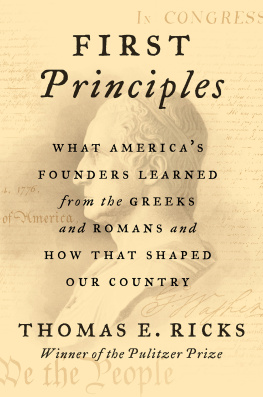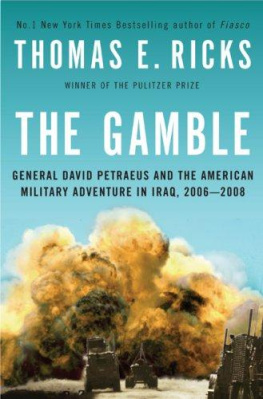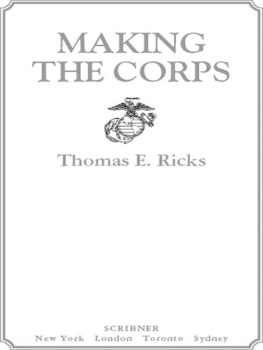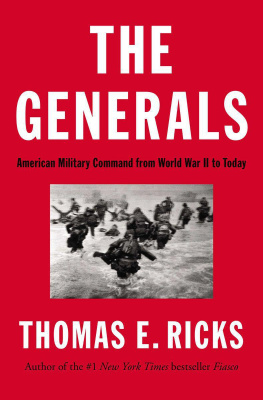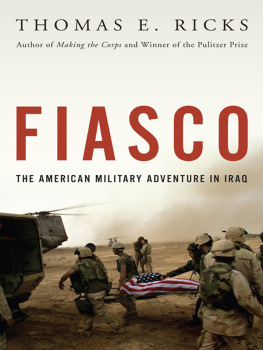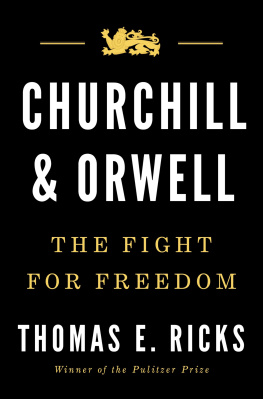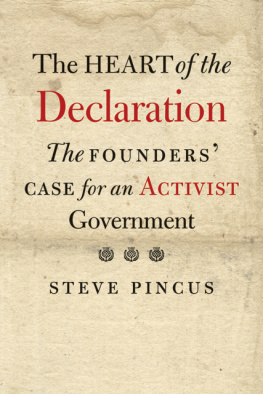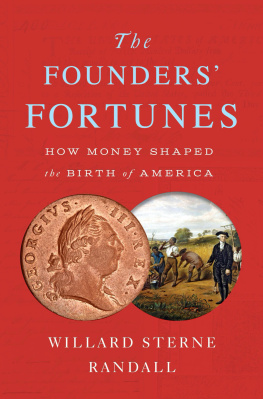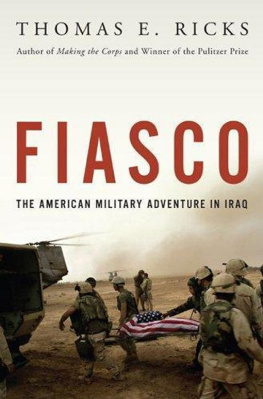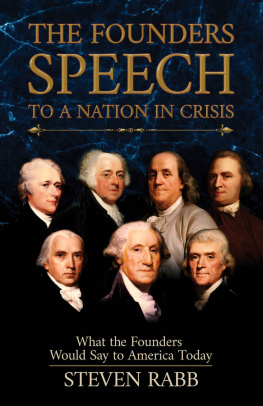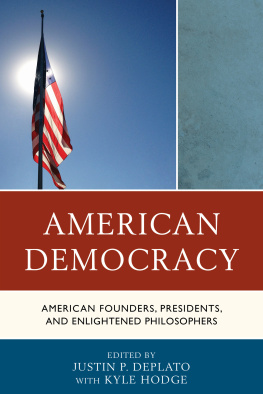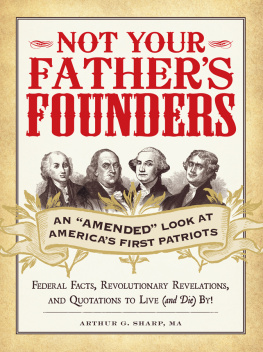Contents
For the dissenters, who conceived this nation, and improve it still
Unless we can return a little more to first principles, & act a little more upon patriotic ground, I do not know... what may be the issue of the contest.
George Washington to James Warren, March 31, 1779
I have quoted the words of the Revolutionary generation as faithfully as possible, including their unusual spellings and surprising capitalizations. I did this because I think it puts us nearer their world, and also out of respect: I wouldnt change their words when quoting them, so why change their spellings? For some reason, I am fond of George Washingtons apoplectic denunciation of an ananominous letter written by a mutinous officer during the Revolutionary War. Seeing this reinforces our need to understand that the past really is a foreign country where they did things differently, and where words sometimes carried different meanings. The one point where I nearly broke this rule is with the variant spellings of the Roman conspirator Catiline, sometimes spelled as Cataline. But I decided to preserve their variations after realizing that this is necessary to enable readers to search for a given quotation in Founders Online, the National Archives wonderful digital compilation of the papers of the leaders of the early United States. Along the same lines, I have where possible quoted from the eighteenth-century editions of books that they might have used, including Greek and Roman authors in translation. The only alteration I have consistently made is to capitalize the first letter of sentences, because I found that leaving them in lowercase made their words more difficult to comprehend.
I also have chosen to use the term First Peoples rather than Indian or Native American. In researching this issue, I was struck by a statement by a group of musicians that We do not call ourselves Native American, because our blood and people were here long before this land was called the Americas. We are older than America can ever be and do not know the borders.
- 1732Birth of George Washington
- 1735Birth of John Adams
- 1743Birth of Thomas Jefferson
- 1751Birth of James Madison
- 17541763Seven Years War, called by Americans the French and Indian War
- 1755Washington witnesses Braddocks Defeat
- Adams graduates from Harvard
- 1762Jefferson, considered graduated from William & Mary, begins to study law under George Wythe
- 1765Stamp Act passed by Parliament to assert British authority over the colonies and to raise revenue to pay for the French and Indian War
- 1768British troops are stationed in Boston for the first time
- 1770Boston Massacre
- 1771Madison graduates from College of New Jersey (Princeton)
- 1772Boston town meeting creates a Committee of Correspondence to communicate about the political situation with other towns and colonies
- 1773Boston Tea Party
- 1774Massachusetts government suspended; colony is placed under British military rule
- First Continental Congress convenes
- 1775FebruaryParliament declares Massachusetts to be in a state of rebellion
- AprilBattles of Lexington and Concord
- JuneBattle of Bunker Hill
- JuneWashington appointed to command the Continental Army
- AugustParliament declares most of the American colonies to be in a state of rebellion
- OctoberBritish shell and burn Falmouth, Massachusetts (now Portland, Maine)
- 1776JanuaryBritish fleet bombards Norfolk, Virginia, for three hours, destroying most of the city
- JulySecond Continental Congress issues Declaration of Independence
- 1777September and OctoberAmerican forces win two battles at Saratoga, comprising the most important victory in the war. Washington fights two battles near Philadelphia, at Brandywine and Germantown, then withdraws to encamp for the winter at Valley Forge
- 1778FebruaryFrance formally allies with the American rebels
- JuneThe British withdraw from Philadelphia, the rebel capital
- 17791780The American effort almost collapses
- 1781Articles of Confederation take effect
- Battle of Yorktown signals the end of the war
- 1783Peace treaty formally ends the war
- 178687Shays Rebellion challenges the postwar distribution of power in Massachusetts
- 1787Constitutional Convention devises new plan of government for the United States
- 1789Washington becomes first president under the new government created by the Constitution
- 179394Reign of Terror in France; Louis XVI and his queen executed
- 1794The Whiskey Rebellion in western Pennsylvania poses another major challenge to the postwar distribution of American power and wealth
- 1796Adams elected president
- 1798Alien and Sedition Acts crack down on newspaper editors and other critics of Adams administration
- 1799Washington dies
- 1801Jefferson becomes president after the outcome is decided by the House of Representatives
- 1804Aaron Burr, Jeffersons alienated vice president, shoots and kills Alexander Hamilton
- 1808Madison elected president
- 1820Missouri Compromise formalizes geographic division of country along the lines of slavery
- 1826Jefferson and Adams die on the same day, fifty years to the day after July 4, 1776
- 1836Madison dies
- 1861American Civil War begins
Prologue
What Is America?
The American novelist and literary critic Ralph Ellison once remarked that, Whenever we as Americans have faced serious crises we have returned to fundamentals; this, in brief, is what I have tried to do. Me too. On that gray Wednesday morning after the presidential election of 2016, I woke up with a series of questions: What just happened? What kind of nation do we now have? Is this what was designed or intended by the nations founders?
Recalling that the people who made the Revolution and wrote the Constitution had been influenced by the thinkers of the ancient world, I decided to go back to fundamentals. I went to my library and took down Aristotles Politics, not knowing I was embarking on an intellectual journey that would last four years. Aristotle led me to other political thinkers, and eventually I found myself rereading the Declaration of Independence and other foundational documents.
Before that Tuesday night in November 2016, I had thought I understood my country. But the result of that election shocked me. Clearly, many of my fellow citizens had an understanding of our nation profoundly different from mine. Foremost among them was the new president-elect. I found myself examining my assumptions about this country and its design, not only questioning what the founders had thought but wondering what had shaped their thinking. What did they read, what did they think, what resonated with them? How different were their intellectual influences from todays? What were they thinking as they constructed this nation? How did we get from there to here? And where are we going on this ship they designed?
In recent years dozens of wonderful biographies of members of the Revolutionary generation have been published, but they tend to gloss over the educations of those people. The biographers would mention where these people went to college (or didnt go, as in the case of George Washington) and the names of their tutors, and sometimes would list some of the books they read. But I couldnt find what they took away from those tutors and books. Who were the men who taught them, and where did they come from? What books influenced them? Where did they get their political ideas, their political vocabularies? What ideas and attitudes would they take from college to adulthood and into the public arenas of Revolutionary America? What ancient works were in their minds as they drafted the Declaration of Independence or debated the Constitution? How does their reliance on Greco-Roman history affect how we live now?

